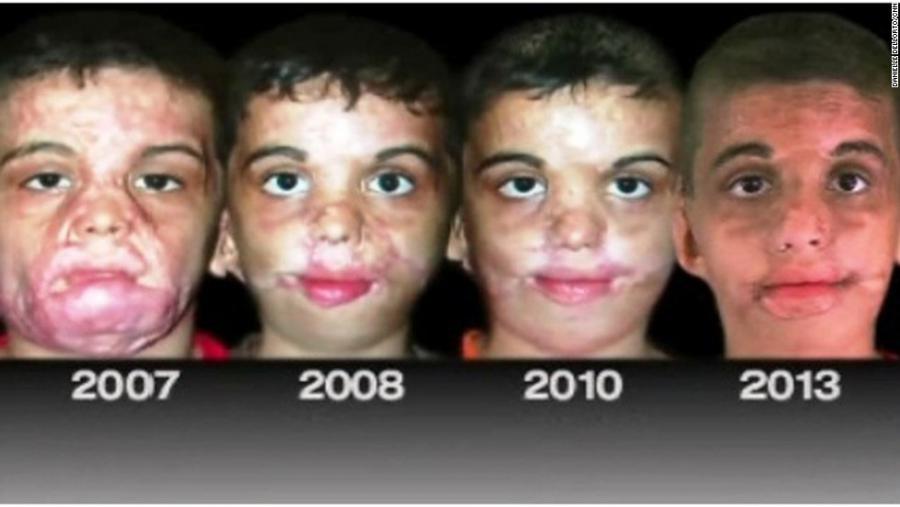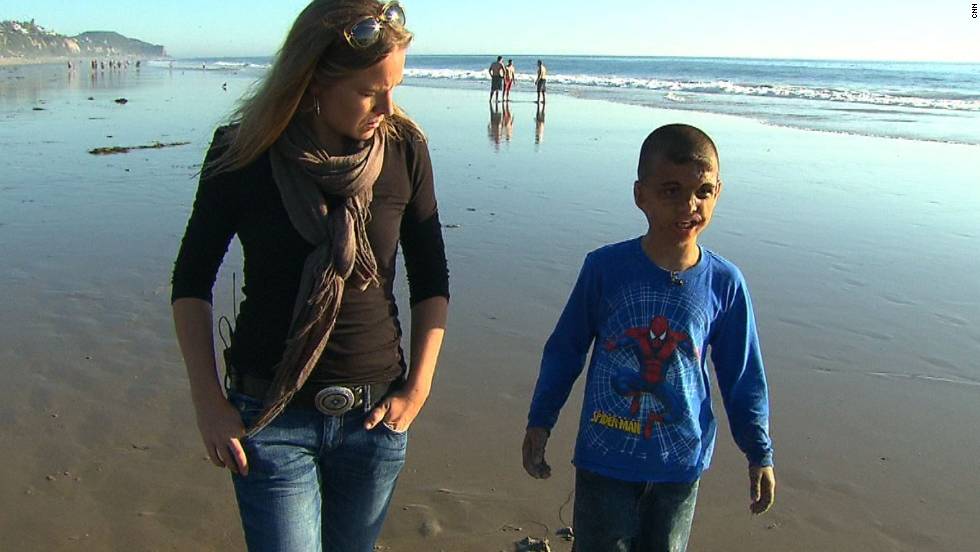
Nearly a decade ago, 4-year-old Youssif sullenly pushed grains of rice through his lips in the kitchen of our Baghdad bureau.
His face was hardened into rivers of scar tissue that kept him from being able to open his mouth.
Masked men had doused him in gasoline and set him on fire outside his own home.
I remember his anger, which was so deep for a child so young. His parents were at a loss. All they wanted was their little boy back -- and to hear him laugh again.
We reported his story in 2007 and received an instantaneous and overwhelming response. The desire to help Youssif transcended religion, ethnicity and race at a time when Iraqis felt largely abandoned by the outside world.

Nothing since has felt better than the moment I was able to call Youssif's parents and tell them their little boy would be getting help. The Children's Burn Foundationin Los Angeles had picked up the case, and CNN viewers had donated hundreds of thousands of dollars to his cause. He would soon be flying to Los Angeles.
I traveled with Youssif and his family from Baghdad to the United States in what can only be described as a mosaic of hilarious, emotional and overwhelming moments.
Relief spread across his parents' faces as they listened to their son laugh and shriek with joy at the sight of the ocean. This was the first time he had seen it.
Youssif's mother, Zaineb, had to wipe away tears as a church group asked whether they could pray for her son. They felt welcomed as they entered this new, unknown country.
Over the years, Youssif has undergone multiple surgeries, and there is still the potential for many more to come. Each is a step toward the finish line, he says.
In many ways, he is just like other teens. He is obsessed with soccer and has many close friends, and he loves studying math and science. He still wants to become a doctor, to help others the way doctors helped him.
"My doctor helped me out, and that encouraged me to help other people, so he's like my role model," explained Youssif.
Thinking of home
He doesn't remember the attack and has very little recollection of Baghdad, if any. On occasion, Youssif speaks to his grandparents, who remain in Baghdad, but their conversations focus mostly on family rather than the security situation there.
But for his parents, the yearning for their homeland is very real, although they know it is unlikely they will be able to go back to Iraq during their lifetimes. Wissam, Youssif's father, found out his sister has cancer; Zaineb's father passed away two years ago; and it's been nine years since either of them hugged their family.
But visiting is out of the question. We continue not to reveal Wissam's identity on camera due to the potential security risks this would bring his family back in Iraq.
"It's a horrible life there. My family says not to even think about visiting them one day. I don't know how they even live there," Wissam said. "I try not to read and see what's going on because whatever I see is sad there, everything is just sad."
Youssif knows how lucky he is. He continues to follow the news out of Iraq about ISIS and the refugee crisis and wonders whether he could have ended up chancing the waters of the Mediterranean.
"Mine is easy," he said of his journey to the United States. "CNN helped me out. ... I feel really bad for all the people, all those kids and stuff."
Wissam explained how different life would be for Youssif as a teenager if he had stayed in Iraq. "I don't think he would even want to go out of the house because of his face," he said. "But as you see him now, he's happy, he's got so many friends. All those surgeries he's going through. It's much better now."
Making ends meet
Life as a refugee is not easy, and the family is struggling financially. Wissam has a part-time job and has been looking for more work but had little luck. He recently started a crowdfunding page to help him provide in the meantime.
As parents, they contemplate moving to a cheaper part of Los Angeles, but Wissam worries about the impact it would have on Youssif, who is currently close to his doctors and based in a community that knows and supports him.
Elsewhere, he would have to start over.
The furniture and toys in the family home are mostly donated. The family has three children: Youssif; his younger sister, Aya; and the youngest, Mustafa, who was born in the United States. They all share one room, with Youssif sleeping on a pullout couch, but the children don't let this bring them down.
Youssif talks about a class project during which he discovered a superhero he related to: Superman.
"Each person had to choose one superhero," he explained in perfect English. "I've been really addicted to Superman recently because I saw the movie and I just like his story as a kid."
The comic book hero also struggled to be accepted and to fit in but didn't let that keep him from making his mark.
But for Youssif today, fitting in is not has hard as it used to be. "Now, I make friends easily, and everyone is nice to me at my school. Some of them even treat me like a brother."
Nine years ago, he told me that the kindness of strangers exists, and he was right. The outpouring of support for Youssif by CNN viewers showed us that we needed to provide a way for our audiences to get involved in stories like this. This led to the creation of the Impact Your Worldinitiative, which has helped raise funds, find volunteers and make an impact for those in need over the last nine years.
Today, Youssif continues to remind us of the importance of kindness. In a world where fear of "the other" is growing, where the building of barricades and rejection feeds directly into the narrative of terrorist organizations, he is a reminder of the transformative power of compassion.
Source: CNN
 FR
FR EN
EN AR
AR








